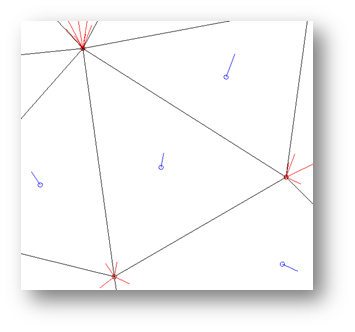Available in TurboCAD Pro, Platinum and Deluxe only
The Show Normals setting is found under Program Setup/Native Draw. It is Of’ by default.
The visualization of the normals make it easier to estimate the smoothness and orientation of the 3D objects, and to find artifacts/defects on those objects.
When this option is On the normals are drawn in red color at the vertices of the 3D objects.
Normals are drawn in blue at the center of facets and show the direction each facet’s is facing. The direction of each normal is determined by the path that the edges of each facet take as they wind around the face. The calculation uses the right-hand rule to determiine the normal.
The size of the normals is approximately 1/10 the size of the surface bounding sphere's radius (the smallest sphere that will enclose the object). In other words the size of the normal is directly proportional to the size of the object.
The direction of the normals take into account the option Reversed Normals which is found in the 3D properties dialog of each object.
The base polygon of the normals are display takes into account the option Double Sided which is found in the 3D properties dialog of each object. Double Sided objects show a double polygon.
Normals for Double and Single sided primitives
...
| Panel |
|---|
Nur von TurboCAD 2D/3D, Professional & Platinum unterstützt |
Die Visualisierung der Normalen vereinfacht die Einschätzung der Glätte und Ausrichtung von 3D-Objekten und die Suche nach Fragmenten/Defekten auf diesen Objekten.
Die Einstellung Normale anzeigen lässt sich im Dialogfeld Programm einrichten (Menübefehl Optionen, Natives Zeichnen) finden. Diese Option ist standardmäßig deaktiviert.
Wenn diese Option aktiviert ist, werden die Normalen an den Scheitelpunkten von 3D-Objekten in roter Farbe gezeichnet.
Normale werden in der Mitte von Facetten in blau gezeichnet und zeigen die Richtung an, in die jede Facette verläuft. Die Richtung jeder Normalen wird bestimmt durch den Richtungsverlauf, die die Kanten jeder Facette um die Fläche herum nehmen. Die Berechnung verwendet die Drei-Finger-Regel, um die Normale zu bestimmen.
Die Größe der Normalen entspricht ca. 1/10 der Größe des Radius der Oberflächenbegrenzungskugel (die kleinste das Objekt umschließende Kugel). Mit anderen Worten ist die Größe der Normalen direkt proportional zur Größe des Objekts.
Die Richtung der Normalen berücksichtigt die Option Umgekehrte Normale, die sich innerhalb der 3D-Eigenschaften jedes Objekts finden lässt.
Das Basispolygon der Normalen berücksichtigt die Option Doppelseitig, die sich innerhalb der 3D-Eigenschaften jedes Objekts finden lässt. Doppelseitige Objekte zeigen ein doppeltes Polygon.
Normale für doppelseitige und einseitige Elemente:
Demo-Videos (englisch):
| View file | ||||
|---|---|---|---|---|
|
...
| View file | ||||
|---|---|---|---|---|
|





